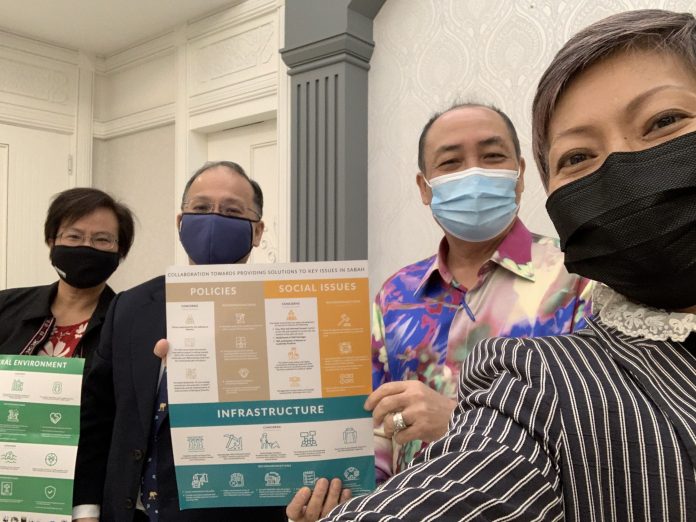
Hajiji, Darrel, Head of Conservation Sabah WWF-Malaysia Dr Robecca Jumin and Chief Executive Facilitator (ChEF) LEAP Spiral and Forever Sabah Cynthia Ong.
KOTA KINABALU: Sabah should continue to implement good environment policies and initiatives such as the Sabah Biodiversity Strategy and the Jurisdictional Certification of palm oil to Roundtable on Sustaina
ble Palm Oil (RSPO) standards for the well-being of the state and its people.
Steadfast continuation of over 20 policies including those related to wildlife action plans, water resources, forestry and environmental education with no erosion of their original intent are among other key recommendations made by 13 civil society and research organisations to the Sabah Government.
In a meeting today with Chief Minister Datuk Seri Panglima Hajiji Mohd Noor, the organisations expressed their intention to collaborate with the Sabah Government in providing constructive solutions and guidance to key issues surrounding policy, social aspects, sustainably developed infrastructure and the natural environment.
They related the need for the newly established government to continue supporting the Jurisdictional Certification Steering Committee for sustainably produced palm oil jointly chaired by the Natural Resources Office and the Sabah Forestry Department, capacity building for biodiversity management and to stay focused on green conservation programmes — all of which contribute to the sustainable socio economic development of Sabah.
Speaking on behalf of the delegation, Datuk Darrel Webber said the NGOs have 187 years of combined experience of working on various issues in the State, leading to a comprehensive list of recommendations.
“These organisations have been working with Sabahans for the sustainable development of Sabah. They work directly with approximately 354 villages throughout Sabah which is a proxy as to their ability to have a granular view of the issues brought to the attention of the Chief Minister. Combined, they hire over 450 staff, mostly Sabahans, with an annual budget of RM28.95 million,” he said.
For social issues, the NGOs would like the government to adopt the concept of Free, Prior and Informed Consent (FPIC), into its policies. This concept helps to assure that local communities rights will not be marginalised for the sake of development and is endorsed by United Nations and has international recognition. It is also the hope of the NGOs that the government will proceed to pursue laws to abolish of child marriages, incorporate polices that assure a minimum of 30 per cent participation of women in leadership roles within government and linked agencies and to this end, assign appropriate ministries to lead on its implementation.
The long-standing issue of illegal immigrants has been a key ingredient in the state’s political debate. Now, is probably the right time for the government to identify neutral and credible parties to facilitate the establishment of a nonpartisan, multi-stakeholder platform that can build consensus and develop granular and implementable solutions to this very divisive issue, Webber said.
Also listed under social issues is the management of solid waste and sewage causing direct discharge into rivers and a recommendation to review policies and laws on solid waste and to encourage zero waste.
In terms of infrastructure development, concerns raised were related to the proposed Papar Dam and its impact on indigenous people and the environment, silica mining at Balambangan Island, a bridge in Sukau that limits wildlife movement and creates new pressures, Tanjung Aru Eco Development (TAED) and the social and environmental impact of the Pan Borneo Highway.
“Our recommendations include greater transparency and alternative proposals in the case of the Papar Dam, to not proceed with silica mining due to the potential negative impact on marine resources, likely loss of great heritage values in Balambangan, and to channel funds meant for the Sukau bridge to build capacity among local communities in diversifying their income base.
“Greater transparency and an updated special Environmental Impact Assessment are needed for the TAED project, and we also stated our recommendation for alternative approaches such as realignment of routes under the Pan Borneo Highway and for improved management of Totally Protected Areas and Protected Areas,” Webber said.
Natural environment related concerns raised were on conversion of forests to other land uses, unsustainable and unproductive management of Forest Management Units (FMUs) especially in areas under Yayasan Sabah, increase of human-wildlife conflict due to forest habitat fragmentation, unsustainable management of the marine environment and related to this fisheries and aquaculture, increasing flooding incidents and poaching or other pressures on wildlife impacting Sabah’s reputation as a premier nature-based destination.
The group recommends that the Government continues to aim for a minimum of 50 per cent land mass under forest cover and 30 per cent under Totally Protected Areas, registration of the Klias Wetland as a RAMSAR site and to apply a High Conservation Value methodology for any forest conversion.
There is a need for transparency in FMU plans and evaluations especially in Yayasan Sabah areas, and support for efforts to produce timber on private lands and non-timber forest products in forest reserves.
“We support the government’s target of designating 13 per cent of seas as marine protected areas and we want to see better policies and legislation, and the protection of water catchments under the Sabah Water Catchment Enactment 1998. It is also timely to endorse the draft Sabah Wildlife Policy 2019 and to increase enforcement and management capacity for wildlife and habitats.
“We want to reiterate that our organisations exist for the sustainable development of Sabah. We have a collective experience of 187 years and we offer this experience, our expertise, as resources for partnership with the stakeholders of Sabah, which includes the government of the day”, Webber said.
The organisations that submitted these concerns and recommendations were Borneo Rhino Alliance (BORA), Bornean Sun Bear Conservation Centre (BSBCC), Danau Girang Field Centre, Forever Sabah, Future Alam Borneo, Kudat Turtle Conservation Society, LEAP Spiral, Malaysian Nature Society – Sabah, Pacos Trust, Sabah Environmental Trust, Stop Fish Bombing, WWF-Malaysia and 1StopBorneoWildlife.
The post State govt urged to continue good policies appeared first on Borneo Post Online.


